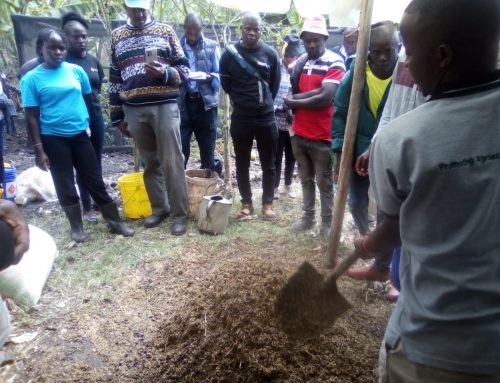Organic farming in Kenya has gained significant momentum in recent years, as more farmers and consumers recognize its benefits for both environmental sustainability and human health. This comprehensive analysis will delve into various aspects of organic farming in Kenya, including the principles, practices, challenges, opportunities, and the overall impact it has on the agricultural sector.
The Principles of Organic Farming in Kenya:
1. Soil Health: Organic farmers prioritize the health of the soil by using natural and sustainable practices like crop rotation, composting, and organic fertilizers. This approach helps maintain soil fertility, structure, and biodiversity.
2. Ecological Balance: Organic farming in Kenya aims to work in harmony with nature, avoiding the use of synthetic chemicals and GMOs. Instead, natural pest control methods, such as beneficial insects, companion planting, and physical barriers, are employed.
3. Animal Welfare: Organic farmers in Kenya adhere to ethical standards when it comes to rearing animals. They ensure proper housing, feeding, and overall well-being of the animals, avoiding the use of growth hormones and antibiotics.
4. Biodiversity Conservation: Organic farming methods encourage the preservation of biodiversity. Farmers promote the growth of diverse crops and preserve natural habitats on their farms, which fosters beneficial insects, birds, and other wildlife.
Practices and Techniques in Organic Farming:
1. Crop Rotation: This practice involves alternating different crops in sequence, which helps to break disease cycles, control pests naturally, and improve soil fertility.
2. Composting: Organic farmers utilize composting techniques to recycle organic waste and crop residues into nutrient-rich compost. This compost is used as a natural fertilizer, enhancing soil fertility and promoting healthy crop growth.
3. Green Manure: By planting specific cover crops like legumes, organic farmers can improve soil structure and fertility. These cover crops are later incorporated into the soil as green manure.
4. Biological Pest Control: Instead of using chemical pesticides, organic farmers in Kenya employ natural methods of pest control. These include the introduction of beneficial insects, trap crops, and using physical barriers like nets or screens.
Challenges in Organic Farming in Kenya:
1. Limited Access to Organic Inputs: Organic inputs like certified seeds, fertilizers, and pesticides can be expensive and not readily available to all farmers. This limits the adoption of organic farming practices among some farmers.
2. Lack of Knowledge and Awareness: Many farmers in Kenya are not fully aware of the benefits and techniques of organic farming. Limited knowledge and training hinder the widespread adoption of organic practices.
3. Market Access and Certification: Gaining organic certification can be a challenging and costly process for farmers. Additionally, accessing premium markets for organic produce can be difficult, further impacting the profitability of organic farming.
Opportunities in Organic Farming in Kenya:
1. Growing Domestic and Export Markets: The demand for organic produce is increasing both domestically and internationally. Kenyan farmers have opportunities to tap into these markets for premium prices, driving the growth of the organic sector.
2. Government Support: The Kenyan government has shown increased support for organic farming through initiatives like training programs, subsidies, and organic certification assistance. These efforts aim to encourage more farmers to adopt organic practices.
3. Environmental Sustainability: Organic farming helps protect the environment by reducing the use of synthetic chemicals, promoting biodiversity, and improving soil health. These sustainable practices contribute to long-term ecological equilibrium.
Overall Impact of Organic Farming in Kenya:
Organic farming in Kenya has numerous positive impacts, including:
– Environmentally friendly practices that reduce soil degradation and water pollution.
– Improved food safety and nutritional value.
– Enhanced soil fertility and long-term productivity.
– Social and economic benefits through increased market opportunities and income for farmers.
– Conservation of biodiversity and preservation of natural resources.
In recent years, there has been a significant shift in consumer preferences towards organic food, both locally in Kenya and globally. This increased demand for organic produce presents a viable opportunity for farmers to adopt organic farming practices and cater to this growing market.
One of the key advantages of organic farming in Kenya is the reduction in the use of synthetic chemicals and pesticides. This not only safeguards the health of farmers and consumers but also protects the environment. Synthetic chemicals used in conventional farming often contaminate water sources, degrade soil quality, and harm beneficial organisms. By avoiding these chemicals, organic farming promotes ecological balance and helps preserve the natural ecosystem.
Furthermore, organic farming practices in Kenya contribute to soil health and fertility. By incorporating organic matter through techniques like composting and green manure, organic farmers improve soil structure, water holding capacity, and nutrient availability. They prioritize soil conservation and employ methods that minimize erosion and nutrient runoff, resulting in better long-term productivity and reduced dependency on external inputs.
In terms of economic benefits, organic farming can offer farmers higher returns compared to conventional methods. Organic produce commands premium prices in both domestic and export markets due to its perceived health benefits, environmental sustainability, and ethical production practices. By targeting these markets, organic farmers have the potential to increase their incomes and improve their livelihoods.
The Kenyan government has recognized the potential of organic farming and has implemented various support programs. These initiatives include training programs, capacity-building workshops, and subsidies for organic inputs. The government has also prioritized the establishment of organic certification bodies, which are crucial for gaining access to premium markets and ensuring consumer confidence.
However, challenges still exist that hinder the widespread adoption of organic farming in Kenya. Limited access to certified organic seeds, fertilizers, and pesticides remains a significant barrier for many farmers. Additionally, a lack of knowledge and awareness about organic farming practices, including the benefits and techniques involved, poses a hindrance to adoption.
To address these challenges, there is a need for increased investment in research and development, extension services, and technical support for farmers. Training and awareness programs should be expanded to reach a wider audience of farmers, while ensuring affordability and accessibility of organic inputs and certification.
Organic farming in Kenya is gaining prominence as farmers and consumers recognize its benefits. While challenges like limited access to organic inputs and knowledge gaps persist, the growing demand for organic produce and government support present significant opportunities. By adopting organic farming practices, Kenya is working towards a sustainable and resilient agricultural sector that protects the environment and nourishes its people.
In conclusion, organic farming in Kenya presents a comprehensive and sustainable agricultural approach that prioritizes environmental conservation, soil health, and consumer well-being. Despite existing challenges, the increasing demand for organic produce and government support provide opportunities for farmers to transition towards organic farming practices. By embracing organic farming, Kenya can enhance its agricultural sector’s sustainability, promote food security, and contribute to a healthier and more prosperous future.
@infolab global
@babamichael




Leave A Comment